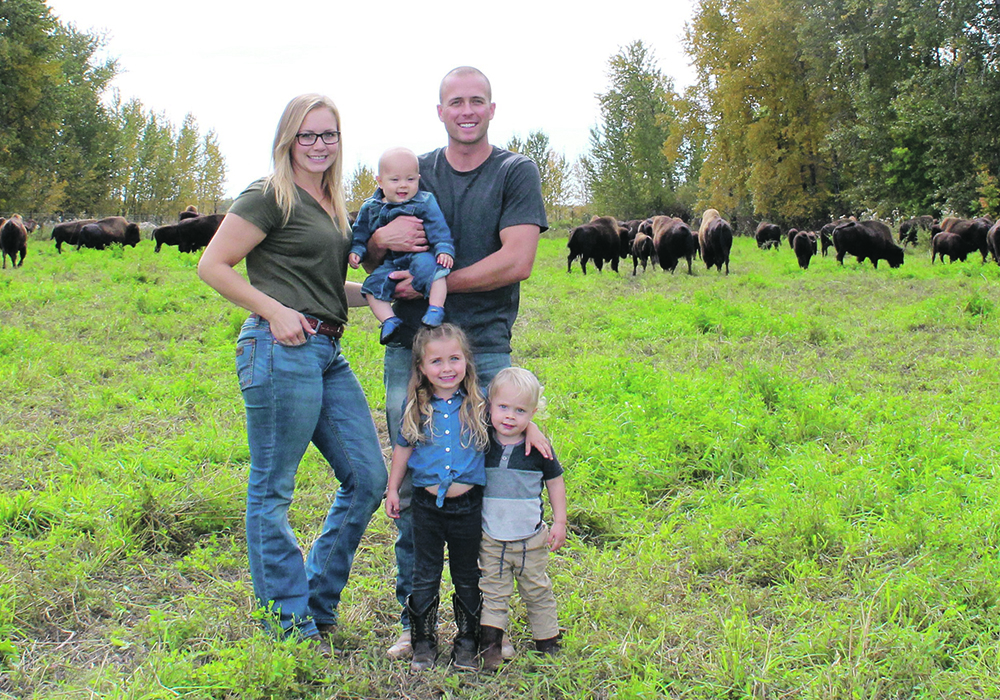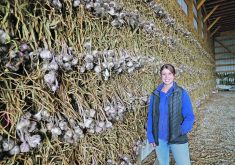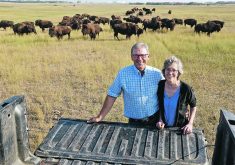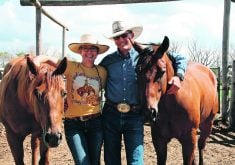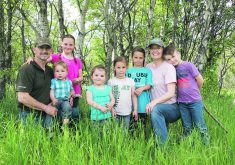On the Farm: The ranch began as a cow-calf operation three years ago but now actively markets the meat it produces
Denver and Becky Johnson saw bison production as a way to return to the community they loved and it also gave them a chance play a role on the family farm where Becky grew up.
The Johnsons are owners of Bison Ridge Farms, a 150-head bison ranch located west of Prince Albert, Sask., on the banks of North Saskatchewan River.
Becky grew up in the area. Her parents, Rob and Sharon Ardell, have grown grain in the region since the late 1990s.
About a decade ago, Becky and Denver moved away from Prince Albert to further their education. But in 2014, they moved back to the area and set down roots.
Read Also

Nutritious pork packed with vitamins, essential minerals
Recipes for pork
When some land came up for sale adjacent to Becky’s parents’ farm, the couple jumped at the chance.
They bought the land, brought in 42 bred bison heifers in January of 2018, and have been building their herd ever since.
If all goes as planned, Bison Ridge will have two breeding herds of about 50 cows each by the end of this year or next.
“We wanted to partner with the family farm in some way and we saw a lot of potential in the bison industry,” said Denver, who also works in Prince Albert as a full-time firefighter.
“So we decided to partner with Becky’s parents in diversifying the operation. We always knew we wanted to farm in some capacity and when we were able to come back and buy some land adjacent to the family farm, that’s really what kick-started the idea.”
Denver acknowledged that getting into bison has involved a steep learning curve.
Neither he, nor Becky, nor Becky’s parents had any previous experience with livestock.
Today, almost three and a half years into the venture, things are panning out well.
Bison prices were strong when the couple got into the business and the market for bison meat continues to gain momentum.
This year, the couple plans to send 40 or 45 animals to slaughter. Meat can be bought through the company’s online store at www.bisonridgefarms.com or through a dozen or so retail partners located in Prince Albert, Melfort and Saskatoon.
Denver and Becky said peers in the industry made the transition to bison farming easier and more enjoyable.
When they were considering getting into the business, Becky and Denver knew a few producers who were only too happy to offer help and advice.
After a few initial conversations with established producers, it became clear that bison would be a great fit for the Johnson’s newly acquired land and for their busy lifestyle, which involves raising three children — Ruby aged 5, Duke, 4, and Stetson, 2.
“We started to see a lot of the benefits in not only raising bison but also in the meat quality,” Denver said.

“They (bison) are incredibly sustainable and self-sufficient.”
“They do really well hands-off. When you’re busy and you’ve got a growing family and you’ve got lots on the go, that’s really attractive ….”
Sustainability also played into the Johnsons’ decision to choose bison, a native grazer that’s been living on the northern Plains for thousands of years.
Transparency and stewardship figure prominently into their ranching philosophy.
Bison Ridge strives to offer high quality products that are raised responsibly and sustainably.
Customers are encouraged to visit the farm to learn more about the how the animals are raised and how Bison Ridge’s rotational grazing system contributes to ecological health.
The family’s initial breeding herd, acquired from a producer in southeastern Saskatchewan, are pure Woods bison.
The herd adapted well to the area and settled in quickly, said Denver, who also serves as a director of the Saskatchewan Bison Association.
The animals do well on a mixture of native grass and tame forages.
Bison Ridge Farms currently has about 400 acres fenced, including some highly productive land that was converted from annual grain production to pastureland.
Feeds include a range of perennial forages, grasses and polycrop mixtures.
“Bison can handle a lot more alfalfa than a beef cow can,” Denver said.
“They’re not as susceptible to bloat.”
With the proper infrastructure in place, breeding animals are left on the range for most of the year and only require supplemental feeding in the dead of winter.
Handling — for tagging, pregnancy checking and any necessary veterinary care — occurs once a year in mid-December to minimize stress on the herd.
Slaughter animals are managed more closely to ensure consistent carcass size and meat quality.
Animals are typically sent to slaughter at weights ranging from 1,100 to 1,300 pounds.
Denver described bison as a lean, healthy meat that’s high in iron and contains less fat than beef or pork. It has a flavour sometimes described as being richer and sweeter than beef.
Because of its leaner nature, some preparation is recommended before cooking.
Recipes and cooking tips are included on the company’s website, www.bisonridgefarms.com.
Denver said bison is gaining traction among niche consumers looking for healthy, sustainably produced meats or alternatives to products that come from large-scale commercial slaughter facilities.
When Bison Ridge Farms got started back in 2018, Denver and Becky had intended to run a cow-calf operation only, with no farmgate meat sales.
“But as things progressed, we really started to see an opportunity to add value by finishing the animals and selling the meat right here in Saskatchewan,” Denver said.
“We were kind of seeing that bison meat was hard for the consumer to find. It wasn’t always readily available and there wasn’t a whole lot of awareness locally.”
The couple decided to test the meat market by slaughtering five animals in 2019. Within a couple of weeks, all of the meat was sold.
That prompted the Johnsons to feed out more animals the following year and focus more energy on marketing.
“It creates a stable market for our product and it allows us to profit, not only from raising animals but also from processing that animal and taking it directly to the consumer,” Denver said.
“We’ve had really good feedback. The economics of farm-to-table is really great, if you’re willing to put in the extra work.”
Denver described the past few years as a rewarding experience that’s involved plenty of hard work and learning.
“There’s been way more to learn than we initially thought … but the producers in the industry have been so great to come alongside and support us….
“As time goes on, we just get more and more excited each day about raising our animals and providing our province with a high-quality meat product.”




